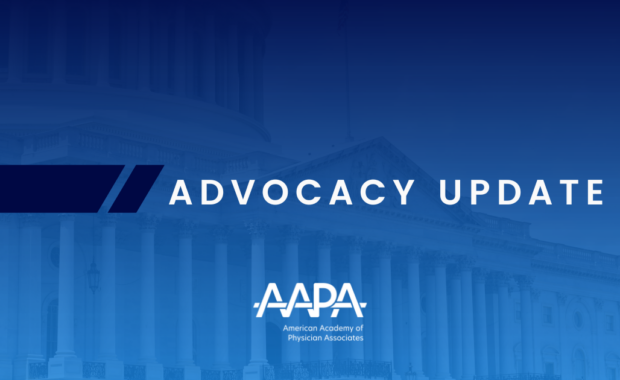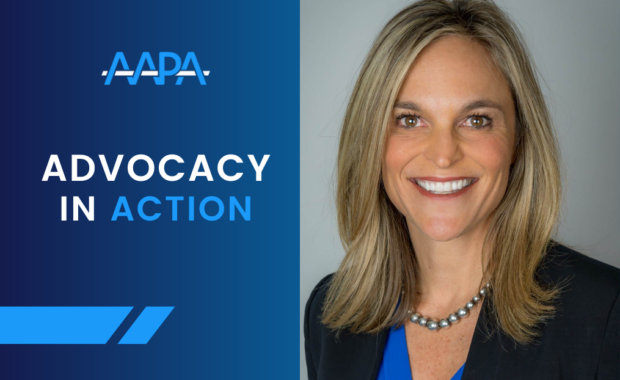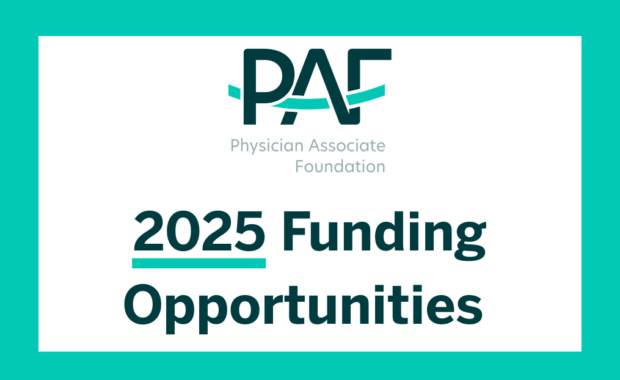How to Talk to Patients About Vaccinations
All PAs should make strong, clinically appropriate, recommendations for COVID-19 vaccinations for their patients this upcoming 2023-2024 season.
September 27, 2023
AAPA Research Department
In the summer of 2023, AAPA, in collaboration with Moderna, brought two PA experts to discuss the importance of talking to your patients about vaccines, including COVID-19. PA Angela LeClerc, MSPA, PA-C practices critical care medicine at Maine Medical Center and Dr. Sampath Wijesinghe, DHSC, AAHIVS, PA-C practices family medicine at Stanford Medicine.
One common misconception about COVID-19 is that the disease is no longer a serious threat. While rates of infection, hospitalization, and death have declined since the beginning of the pandemic, the mortality rate for COVID-19 is still higher than other respiratory diseases. Between June 2022 and 2023, there were more than 120,000 deaths due to COVID, which is 2.5 to 10 times higher than deaths related to the flu in a typical year.
However, vaccination rates in the United States have significantly decreased. As of May 10, 2023, approximately 80% of individuals across all age groups had received at least one vaccine dose, but only about 15% had received a bivalent booster. Even in most susceptible adults, 65 and older, approximately 50% lower immunization rate dropping from around 95% to approximately 43% with bivalent booster. Younger adults were even lower with only about 15% of adults 18-64 years old receiving the bivalent vaccine.
What is new with the upcoming COVID-19 vaccine formulation?
In June 2023, the FDA, following a meeting with their Vaccines and Related Biological Products Advisory Committee (VRBPAC), recommended that the vaccine composition be updated to a monovalent COVID-19 vaccine with an XBB-lineage of the Omicron variant. This is a new variant of COVID-19 not previously included in earlier vaccine formulations. The CDC Advisory Committee on Immunization Practices (ACIP) is expected to provide final recommendations for patient vaccinations in late Summer 2023 with updated vaccine doses will be broadly available in the fall of 2023.
Who is the right person to talk to patients about vaccinations?
In addressing the crucial issue of who should discuss vaccinations with patients, it is essential to recognize that all healthcare professionals, including PAs, are well-equipped to engage in these conversations. PAs are experts in medicine and know the right recommendations for their patients. They have the knowledge and the ability to have conversations about why they recommend each vaccine specifically for them and can include the scientific background for the benefits and risks.
Every PA, regardless of their specialty or practice setting, has the capacity to recommend the necessary vaccine for their patients.
Listen to two PAs discuss why this is so important.
How do PAs combat misinformation and disinformation about vaccines?
 There is a multitude of reasons for declining COVID-19 vaccination rates including complacency, concerns, confusion, and hesitancy based on misinformation, disinformation, and social and political factors. A 2022 AAPA survey found that less than 14% of PAs were very or extremely confident in their ability to overcome objections to the flu vaccine and 50% were only “somewhat confident.” It is likely that similar challenges exist regarding COVID-19 vaccinations.
There is a multitude of reasons for declining COVID-19 vaccination rates including complacency, concerns, confusion, and hesitancy based on misinformation, disinformation, and social and political factors. A 2022 AAPA survey found that less than 14% of PAs were very or extremely confident in their ability to overcome objections to the flu vaccine and 50% were only “somewhat confident.” It is likely that similar challenges exist regarding COVID-19 vaccinations.
For PAs who want to increase their ability to overcome patient objections to vaccines, the AAPA COVID-19 resource center provides a wealth of valuable resources. These resources, though centered on COVID-19, offer insights applicable to all vaccine and provide guidance in an era filled with uncertainty.
For PAs looking to learn even more, a 2023 publication, Vaccine hesitancy educational tools for healthcare providers and trainees: A scoping review, provides evidence-based resources to help PAs have conversations about any vaccine hesitancy, including descriptions of the type of resource and how it may be implemented.
How can PAs make a change?
 “We really need to fight the infodemic or we need to get in front of these misleading facts or websites or social media posts. And we need to provide advocacy at the state and national level for public health policies that prevent this.”
“We really need to fight the infodemic or we need to get in front of these misleading facts or websites or social media posts. And we need to provide advocacy at the state and national level for public health policies that prevent this.”
Watch the full conversation here.
Noël Smith is AAPA’s Senior Director of PA & Industry Research & Analysis. She can be reached at [email protected].
You May Also Like
AAPA COVID-19 Resource Center
Insights into PAs’ Experiences with Influenza Vaccines



